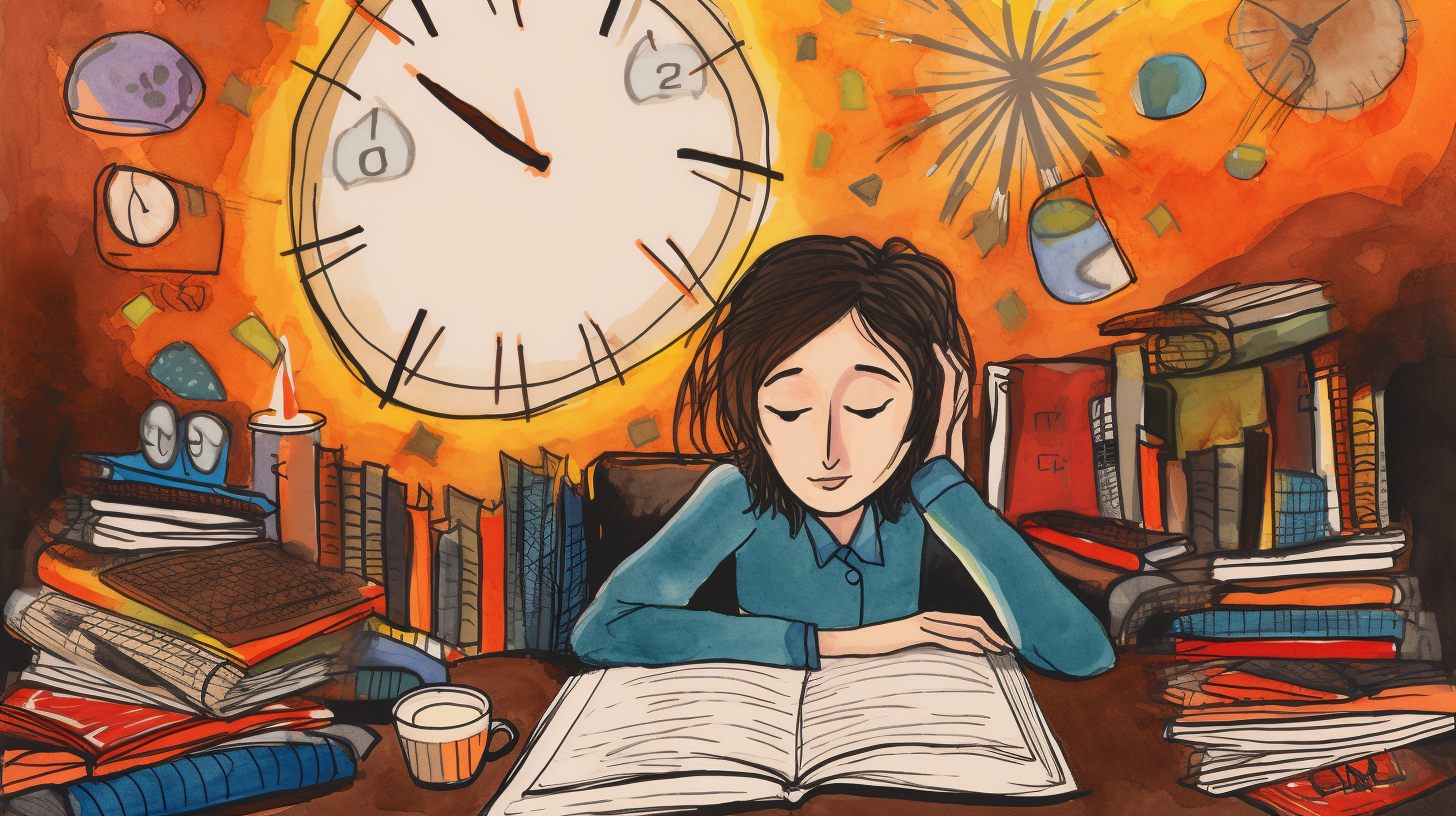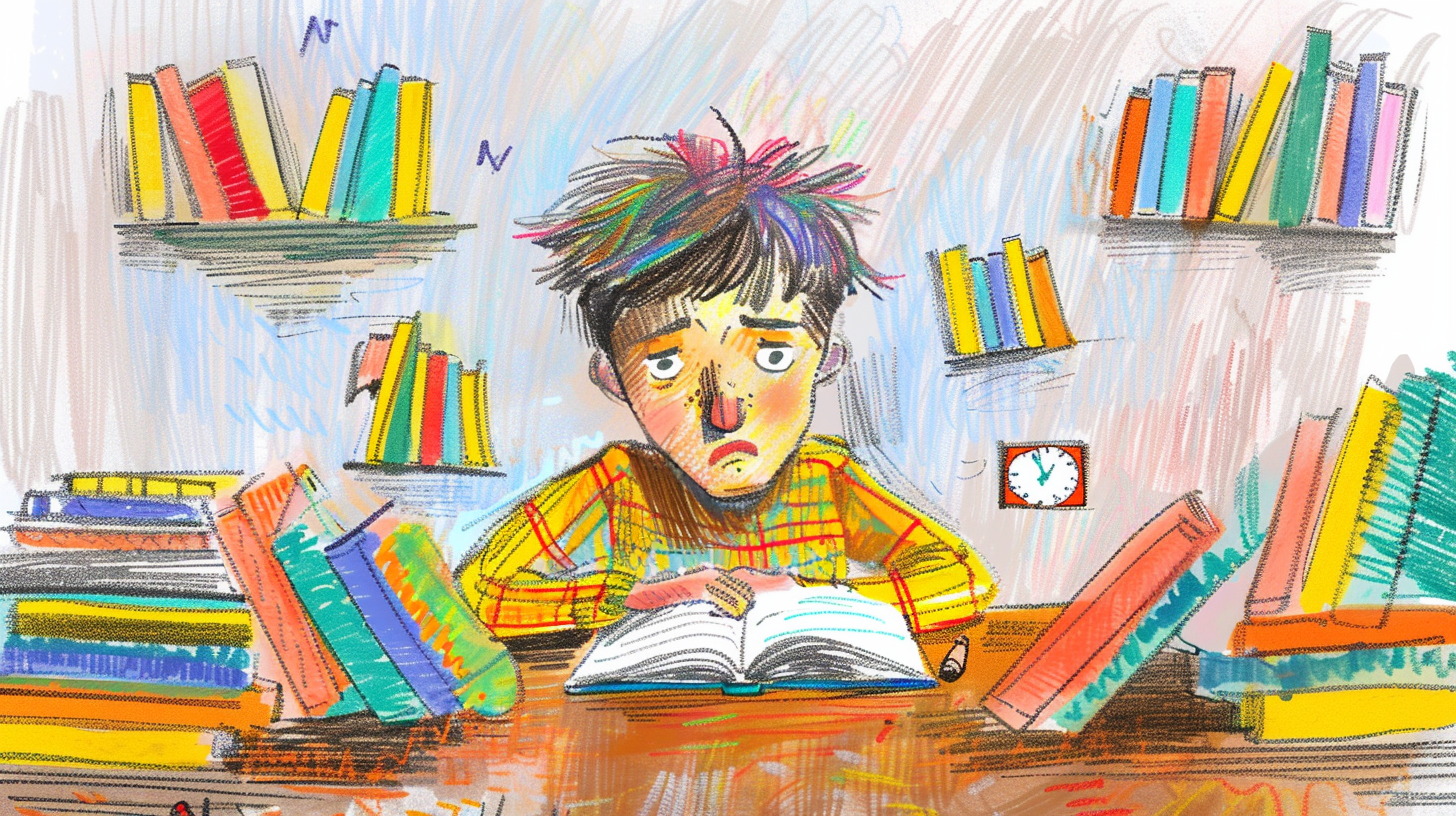Have you ever wondered how does reading reduce stress? It’s not just an escape from reality but a proven stress buster. A University of Sussex study revealed reading can lower stress by a staggering 68%, outperforming other relaxation methods. In this text, you’ll uncover the fascinating connection between immersing yourself in a good book and melting away stress.
We’ll investigate the science behind reading and stress reduction, exploring how losing yourself in a narrative can significantly benefit your mental health. You’ll also learn about the types of books and genres most effective at reducing stress and how to seamlessly incorporate reading into your stress-reduction routine. Get ready to turn the page on stress and start a new chapter in relaxation.
The Connection between Reading and Stress Reduction
Reading as a Form of Escapism
When life’s pressures mount, you’ve likely sought a getaway. Reading provides an escape, enabling you to transcend the mundane. It immerses you in narratives that whisk you away from daily stressors. This isn’t mere fanciful talk; it’s backed by science showing how reading mental health improvements go hand-in-hand. As you jump into a tale through an audiobook, the outside world fades, your focus sharpens, and stressors dissipate. This psychological benefit of reading isn’t limited to traditional books; audiobooks offer the same escapism without requiring full visual attention.
Even better, you can enhance this escape with an audiobook while completing other tasks, such as cooking or commuting. Can reading reduce stress? Audiobooks amplify that relief by offering the flexibility to absorb storytelling in almost any environment. Listen, imagine, and watch your stress levels fall.
The Relaxing Effects of Reading
Let’s investigate what happens when you engage in reading for stress relief. As you listen to an audiobook, your heart rate lowers, muscles unwind, and stress fades. Reading reduces stress, and audiobooks make this relaxation more accessible by allowing you to relax with a story, even in a busy subway or during a brisk walk. Reading and mental health have a proven beneficial relationship. Data shows that reading can reduce stress by up to 68%. Audiobooks’ convenience means that stress reading can be replaced with calming narration that guides you to tranquility wherever you are.
Audiobooks are potent to combat anxiety, promoting relaxation and mental well-being. If you’re wondering, “Is reading good for your mental health?” the affirmative answer resonates here with audiobooks’ added ease. They envelop you in a soothing experience that reduces stress and enriches your mind. Reading for anxiety relief doesn’t require silence and a cozy corner anymore; audiobooks bring you the exact therapeutic value on the go. Indulging in a gripping audiobook isn’t just a leisure activity; it’s a step towards enhanced mental health and stress management.
The Science Behind Reading and Stress Reduction
The Impact of Reading on the Brain
Your brain is an intricate network of connections, and reading is a potent stimulus for this cognitive matrix. When you jump into a book, whether a gripping novel or an insightful non-fiction work, you’re not just flipping through pages but firing up a complex array of circuits in your brain; this engagement leads to a multitude of psychological benefits of reading.
Reading lifts stress from your shoulders. This activity reduces stress by activating your imagination and transporting you to another realm. This isn’t just a fleeting feeling; it’s a scientifically proven method to alleviate anxiety. Stress reading becomes stress relieving as it slows down your heart rate and relaxes your muscles. Reading for stress relief effectively shifts your energy from worries to concentration, demonstrating how reading reduces stress.
Also, MRI scans reveal that reading involves different regions of your brain working in harmony. This increased neural activity strengthens mental pathways, improving memory, cognitive function, and creativity. Consider the mental health and reading relationship if you wonder how reading can reduce stress. Regular exposure to reading results in long-term brain health benefits and can also be a tool for reading and anxiety management.
Reading as a Mindfulness Practice
Have you ever considered reading as a coping mechanism? As you immerse yourself in literature, you’re practicing mindfulness. This is why reading is good for your mental health. By focusing on the words and the unfolding narrative, you center your thoughts, bringing your attention away from stress triggers. It’s an exercise in mental health reading that allows you to gain anxiety relief with every page.
When you opt for an audiobook, this mindfulness practice becomes even more accessible. The convenience of audiobooks allows you to engage in a relaxing reading session anywhere, at any time. Whether you’re on a busy commute or doing household chores, you can listen to a story and let the soothing voice of the narrator reduce your anxiety. This highlights how reading for anxiety relief isn’t confined to print; audiobooks offer a versatile solution, broadening the scope of how reading helps with stress.
The research underscores how reading, and by extension listening to audiobooks, is a powerful agent for stress reduction. Amid a hectic lifestyle, finding time to sit with a book might be challenging, but audiobooks circumvent this issue entirely. Overcoming barriers to reading mental health benefits has never been simpler.
Types of Books and Genres that Reduce Stress
Fiction and Imaginative Worlds
Embrace the escape that fictional narratives offer – your passport to stress relief is found within the pages of imaginative worlds. When reading reduces stress, it’s often thanks to tales spun with intricacy and care, whether epic fantasies or quiet contemporary dramas. Engaging with fiction isn’t just about entertainment; it’s therapeutic. As you traverse these alternative realities, your mind unwinds, and your stress levels can decrease significantly, making reading good for your mental health. Audiobooks amplify this effect for many, providing a rich, immersive experience that allows for deeper engagement with the story.
Fiction genres known to be especially adept at this form of mental transportation include:
- Fantasy
- Science Fiction
- Mystery
- Romance
These genres offer different flavors of escapism, but they share one fundamental trait: the ability to capture your attention wholly, providing a buffer against the stress reading of day-to-day life.
Self-help and Personal Development Books
Diving into self-help and personal development books is a proactive way of combating stress and encouraging mental health reading. These books guide managing symptoms and improving overall well-being, proving that reading is good for you. Incorporating 30 minutes of this reading for stress relief into your daily routine can enhance your cognitive skills and provide actionable strategies to handle anxiety and depression effectively.
Grounded in research and anecdotal evidence, self-help books that focus on mental health and reading can include topics such as:
- Mindfulness and Meditation
- Cognitive Behavioral Techniques
- Happiness and Positive Psychology
- Stress Management and Coping Skills
As they are often structured for gradual progress, audiobooks in this genre can be especially beneficial, allowing you to listen, learn, and practice these techniques hands-free.
Poetry and the Power of Words
Never underestimate the calming influence of poetry. The rhythmic nature of verse is akin to a musical composition, which resonates with us deeply emotionally. Reading poetry can be a significant coping mechanism, providing comfort and clarity through its cadence and the evocative power of its language. Whether you’re seeking anxiety relief or a way to combat a stressful moment, the right poem can feel like taking a deep, cleansing breath.
Powerful forms of poetry that can aid in stress reduction include:
- Sonnets
- Free Verse
- Haiku
- Narrative Poetry
Listening to poetry through audiobooks can enhance the experience; the performer’s voice adds another layer to the soothing power of words, helping to calm your mind and alleviate reading stress.
Incorporating Reading into Your Stress Reduction Routine
Creating a Cozy Reading Space
Creating a cozy reading space is a must to enhance your experience and maximize the stress relief benefits of reading. Select a quiet corner of your home free from distractions. Comfort is critical, so include plush cushions and a warm blanket. Soft lighting, like a reading lamp or candles, can add to the ambiance and make it easier on your eyes. A dedicated space signals your brain that it’s time to relax, activating the relaxation response suggested by health experts.
Setting Aside Dedicated Reading Time
Allocating a specific time for reading daily fortifies reading as a coping mechanism for stress. Even just a few minutes can make a difference. Studies indicate that reading can reduce stress levels significantly, so identifying when you’re most likely to be uninterrupted is essential. Early mornings or before bed can be ideal for many to engage with audiobooks. Audiobooks, in particular, offer the convenience of enriching your mind while multitasking or during commutes. They’ve provided similar psychological benefits of reading without requiring complete visual focus.
Joining a Book Club or Reading Group
Participation in a book club or reading group can amplify the mental health benefits of reading. It’s a great way to connect, share experiences, and gain new perspectives. Reading and discussion groups encourage commitment to your reading goals and foster a sense of community.
Is reading good for your mental health? Absolutely, and sharing that process with others can add to its effectiveness. You can opt for local clubs or digital groups—many of which offer audiobook options—for added flexibility. Remember, reading to reduce stress doesn’t have to be solitary; communal activities like book clubs can alleviate feelings of loneliness, contributing to your overall well-being.
Conclusion
Embracing reading as part of your daily routine can be a powerful tool for stress relief. You’re taking proactive steps toward managing stress by setting up a tranquil reading nook and dedicating time to lose yourself to books. Remember, it’s not just about the act of reading itself but also about the community and shared experiences that can come from discussing books with others. So grab your favorite novel, find your cozy corner, and let the pages whisk your stress away. Your mind will thank you for it.
Frequently Asked Questions
How does reading improve your brain?
Reading stimulates neural activity, enhancing neural pathways and improving cognitive functions such as memory and recall. It can counteract the distraction-oriented tendencies we develop from frequent technology use.
Can reading reduce mental health issues?
Yes, regular reading has been linked to lower blood pressure, reduced stress levels, improved sleep quality, and potentially increased longevity, promoting mental and emotional health.
How does reading reduce stress in children?
Reading offers an immersive escape, allowing children to focus on the narrative instead of their stressors. Like adults, this focused quiet time can reduce stress and anxiety, comparable to the effects of a yoga session.
How can reading reduce exam stress?
Reading for pleasure has been shown to reduce stress by up to 68% by lowering your heart rate and relaxing your muscles. When exams approach, taking brief 10-minute reading breaks can effectively alleviate stress.
How long should you read to reduce stress?
Studies suggest that reading for at least 60 minutes after a stressful event can significantly decrease anxiety and physiological stress indicators such as heart rate and blood pressure.




